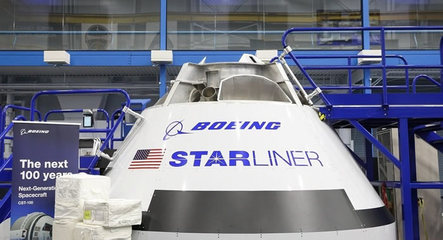
According to reports from multiple media outlets cited by Jimu News, Boeing's "interstellar airliner" spacecraft was forced to cancel its highly anticipated first manned test flight mission due to technical malfunctions with only a few minutes left in the countdown to launch. This sudden change not only disappointed global aerospace enthusiasts, but also filled Boeing's future in the aerospace field with uncertainty.
This test flight mission was originally seen as a major breakthrough in the US aerospace industry, carrying Boeing's hope of returning to the manned space market. However, just before the launch, as the countdown gradually approached that exciting moment, an accident occurred. The launch mission suddenly paused less than four minutes before the scheduled time, shocking and disappointing both the on-site audience and the global audience.
NASA subsequently announced that due to ground system malfunctions, the launch mission for that day had to be cancelled. This news undoubtedly dealt a heavy blow to Boeing. As an established enterprise in the aerospace industry, Boeing once held a pivotal position in the US and even global aerospace market. However, in recent years, with the rise of competitors and frequent technical problems, Boeing's position has become precarious.
In fact, the failure of this test flight mission is not the only setback for Boeing in the aerospace field in recent years. Previously, Boeing's 737 MAX series aircraft were grounded and investigated globally due to safety issues, which had a serious impact on the company's reputation and financial condition. Now, the failed test flight of the interstellar spacecraft has once again put Boeing in a difficult situation.
At the same time, SpaceX's "Dragon" spacecraft, a competitor, has successfully carried out commercial manned space missions multiple times, winning the favor and trust of NASA. In contrast, Boeing's interstellar aircraft seems to have gradually lost its position as the main manned spacecraft. This not only deprives Boeing of its competitive advantage in the commercial market, but also puts enormous pressure on its technological research and innovation.
For Boeing, this unexpected cancellation is undoubtedly a heavy blow. However, from another perspective, this also provides an opportunity for Boeing to reflect and improve. In the future, Boeing needs to pay more attention to technological innovation and quality assurance in order to stand undefeated in the fierce aerospace competition.
Firstly, Boeing needs to conduct a thorough analysis of the reasons for the failure of this test flight mission, identify the root cause of the technical malfunction, and take effective measures to resolve it. At the same time, the company also needs to strengthen cooperation and exchanges with other aerospace enterprises and research institutions, and jointly promote innovation and development of aerospace technology.
Secondly, Boeing needs to strengthen its control and supervision of product quality. Whether it's an airplane or a spacecraft, safety is the primary consideration. Boeing should establish a stricter quality management system to ensure that every product meets high standards of safety requirements.
In addition, Boeing needs to pay attention to changes in market demand and competitive landscape. With the continuous development and growth of the commercial aerospace market, more and more enterprises are entering this field. Boeing needs to closely monitor market trends and adjust its strategy and business layout in a timely manner to adapt to market changes and demands.
Finally, Boeing needs to strengthen brand building and public communication. As an established enterprise in the aerospace industry, Boeing's brand image and reputation are crucial for its future development. The company should enhance its brand image and public awareness by actively participating in public welfare activities and strengthening media promotion.
In short, although the failed test flight of the Starplane spacecraft has brought significant challenges and difficulties to Boeing, it has also provided an opportunity for reflection and improvement. As long as Boeing can face problems, actively respond to challenges, and continuously improve its technological level and market competitiveness, we believe that it can still occupy a place in the future aerospace field.

Driven by the Trump administration's push to relax financial regulations and the recovery of investment banking business, the market value of the six major banks in the United States has cumulatively increased by approximately 600 billion US dollars by 2025.
Driven by the Trump administration's push to relax financia…
On Christmas evening, U.S. President Trump posted on social…
According to multiple foreign media reports, the recent fin…
The middle class, once regarded as the cornerstone of Ameri…
On December 19th local time, the US military launched a lar…
The Boxing Day sunshine should have cast a false glow of pr…